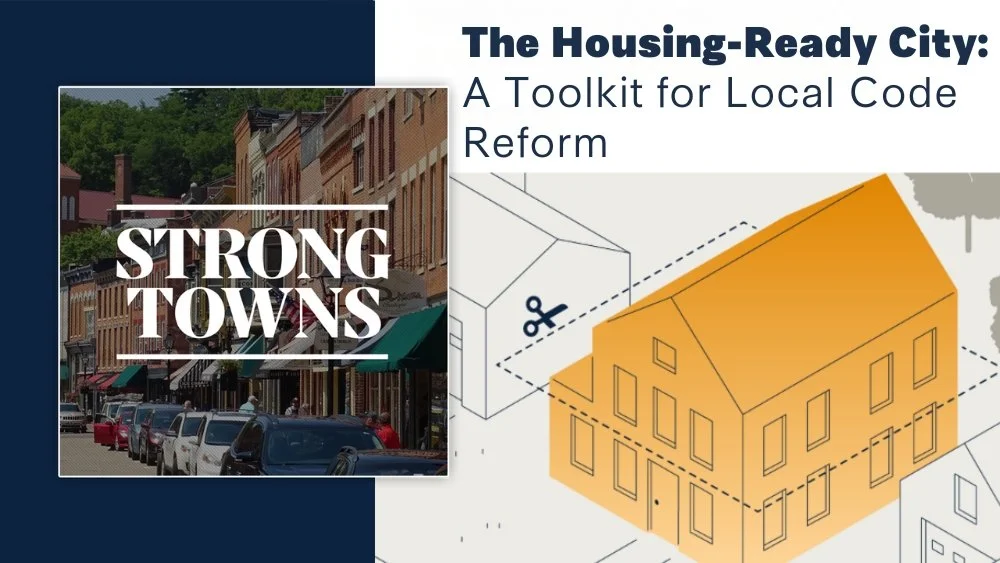The Suburban Experiment killed the starter home. Here's how cities can bring it back to life.
Read MoreMany people think that increased efficiency and economies of scale in the housing market are the key to affordability. However, these benefits are not actually appearing. We do need innovation, but not in the form of new interest rate manipulations or complex securitization schemes.
Read MoreAcross North America, parking mandates harm businesses, residents and cities. Fortunately, a rapidly growing number of cities are questioning these requirements, inching toward reforming or even repealing them altogether. Here are some of the communities that are rethinking their approaches.
Read MoreJosh Stewart is an advocate from Littleton, Colorado. A year ago, his 12-year-old son was struck and killed by a car while biking to school. Since then, Josh has been relentlessly pushing for safer streets in his community. He joins Norm today to share his story and what he’s learned over the last year of advocacy work. (Transcript included.)
Read MoreZoning codes across the country attempt to define what a "family" is, often in ways that are not only outdated but also legally tenuous at best. Instead of pretending we can enforce arbitrary definitions of family, let’s focus on what actually impacts people's lives.
Read MoreDr. Jonathan Gingrich is a professor of engineering at Dordt College in Iowa. Unsatisfied with the standard materials for his transportation engineering class, he incorporated safe street design, including having his class conduct a Crash Analysis Studio. He joins today’s episode to talk about how he did this and the benefits it had for his students. (Transcript included.)
Read MoreJust as a fragile ecosystem can wither without the right conditions, our housing system is struggling under the weight of imbalance. But small, intentional shifts can restore stability. The seeds of change are already planted. It’s time to cultivate them.
Read MoreWhen a development project dares to break the Suburban Experiment mold, it faces intense scrutiny from both opponents and advocates. Ironically, these are the very projects we should be studying — and even celebrating. Culdesac Tempe, a car-free community in Arizona, is one such project.
Read MoreCo-hosts Abby Newsham and Chuck Marohn discuss the challenges faced by Victoria, Prince Edward Island, a town of 139 residents. They talk about how very small towns like Victoria show the absurdities of the Suburban Experiment best — and feel its consequences most keenly. (Transcript included.)
Read MoreOn January 13, 2025, the city council of Bellingham, Washington, eliminated parking mandates citywide. This decision is a key step in reducing barriers to housing development.
Read MoreWith office vacancies and housing needs at record highs, converting one into the other seems like an obvious fix. However, office conversions are very difficult and expensive. Cities would get better results by enabling incremental development.
Read MoreBack in September, Sacramento became the first city in California to allow multiunit housing in all residential neighborhoods. Here’s what that means for residents seeking housing.
Read MoreChuck is joined by Seth Zeren, a neighborhood real estate developer, to discuss the six code reforms recommended in “The Housing-Ready City: A Toolkit for Local Code Reform.” (Transcript included.)
Read MoreMultigenerational living was common before restrictive zoning laws made it illegal to have more than one household in a single-family home. By letting homeowners convert existing houses into duplexes or triplexes, cities can give residents the flexibility to live where they want at a price they can afford.
Read MoreThe Trump administration’s elimination of congestion pricing was shortsighted, but NYC’s congestion pricing was deeply flawed from the start. If congestion pricing is ever going to work as intended, it needs to be revamped with the right priorities.
Read MoreReducing minimum lot sizes can unlock the potential for smaller, more affordable homes while meeting the needs of the community. Here’s how one developer got community support and multiplied housing availability.
Read MoreThe Finley Street Cottages project in Atlanta, Georgia, shows how parking mandates can prevent desperately needed development — and how removing those mandates makes housing more attainable and affordable.
Read MoreSmall, adaptable homes create opportunities for individuals and families to build stable, connected lives. Here’s how this style of development is creating housing opportunities in Florida.
Read MoreChairman of the Board Andrew Burleson discusses recent strides Strong Towns has made and where the organization needs to go from here.
Read MoreJesse Russell is the founder of Hiatus Homes, a development company specializing in small home design and cottage communities. He joins the podcast today to discuss how he became a small-scale developer and how to navigate the challenges of building small homes. (Transcript included.)
Read More



















